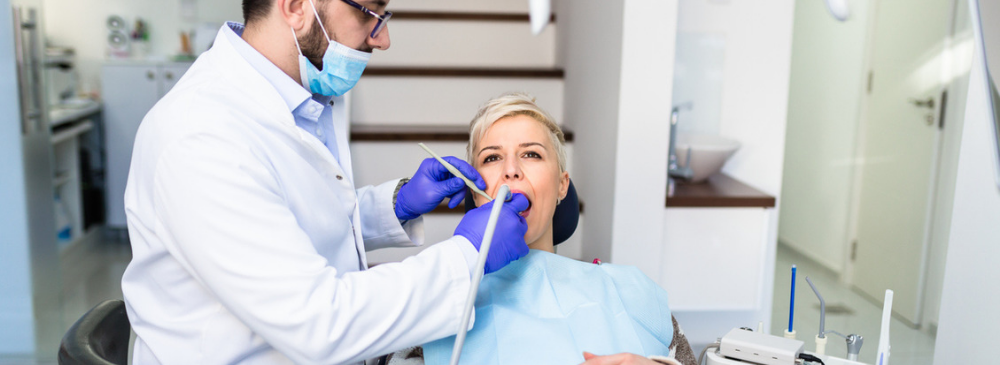Pregnancy and gingivitis go together like peanut butter and jelly. No? Okay, maybe not. But pregnancy gingivitis is a legitimate concern for expectant mothers. Surging hormones during pregnancy cause all sorts of changes to your body, including your gums.
A study by the University of Alabama Birmingham School of Dentistry shows between 40-80% of women experience some degree of pregnancy gingivitis. Not to worry though; it is easily treatable, especially if caught early. Here is what to watch for and how to treat pregnancy gingivitis.
Changes to Your Mouth During Pregnancy
Hormones cause your gums to swell at various times in life, including during pregnancy. All of that extra estrogen and progesterone your body needs to grow a baby also causes extra blood to flow to your gums. This, in turn, makes your gums more sensitive to plaque and bacteria, causing swelling and bleeding — AKA pregnancy gingivitis. Women are most susceptible to pregnancy gingivitis between the second and eighth months of pregnancy.
Gingivitis, during pregnancy or otherwise, is a mild form of gum disease. If left untreated, though, gingivitis leads to more serious gum disease and increases your risk of cavities and loss of bone around your teeth. In other words, although pregnancy gingivitis seems like nothing more than an annoyance, it is wise to take it seriously.
Signs of Pregnancy Gingivitis
The most common signs of pregnancy gingivitis are:
Swollen or puffy gums
Tender gums
Gums that are more red than usual
Unusually bad breath
Receding gums
If you notice any of these signs of pregnancy gingivitis, contact your dentist.
Ready to Buy Dental Insurance?
This article is very high-level information. We recommend you always review plan details and get a quote before you purchase a dental insurance plan. We offer 5 plans with different coverage and monthly premiums.
It’s Not Just Your Teeth: Gum Disease and Preterm Labor
As I mentioned earlier, pregnancy gingivitis progresses to more serious periodontal disease if it isn’t treated. Periodontal disease is associated with more serious health issues, including preterm labor. The theory being that bacteria in the mouth moves to the rest of the body, colonizing in the fetal membranes and ultimately causing the uterus to contract and the cervix to thin and dilate. Happy news at 40 weeks, but less so at earlier points in your pregnancy.
How to Treat Pregnancy Gingivitis
The good news: pregnancy gingivitis is both preventable and reversible. In addition to visiting your dentist, these at-home treatments help catch pregnancy gingivitis in its early stages.
Maintain good oral hygiene
For mild pregnancy gingivitis, stepping up your brushing and flossing might be all you need. Even though pregnancy sometimes makes you so tired that brushing is the last thing on your mind, do your best to brush twice and floss daily. This is your first and best defense against pregnancy gingivitis.
Rinse with saltwater
Salt is a natural disinfectant. Research shows rinsing regularly with saltwater helps heal gum inflammation caused by pregnancy gingivitis. Mix ½ tsp of salt in a glass of lukewarm water and rinse for up to 30 seconds. Do this once or twice each day until the symptoms of your pregnancy gingivitis go away. A word of caution though: long-term use of saltwater rinses wears away at your tooth enamel. If a saltwater rinse doesn’t do the trick in about a week or so, it’s time to talk to your dentist.
Use a mouthwash
Using an alcohol-free mouthwash once each day helps prevent and treat mild pregnancy gingivitis by killing harmful bacteria in your mouth. As always, use mouthwash only as directed.
Rinse after morning sickness
Throwing up because of morning sickness causes stomach acids to coat your teeth, which is never a good thing. If your teeth are already vulnerable because of pregnancy gingivitis, these acids become that much more harmful to your enamel. After you experience morning sickness, the American Dental Association recommends rinsing your mouth with water or a mixture of 1 cup water to 1 tsp baking soda. Spit it out and brush your teeth 30 minutes later.
When to See a Dentist for Pregnancy Gingivitis
Regular visits to your dentist help prevent and treat pregnancy gingivitis, and most dental procedures, including dental x-rays, are safe during pregnancy. So, don’t avoid the dentist when pregnant even if you dread the idea of sitting still in a dental chair for thirty minutes with a bowling ball pressing on your bladder.
Your dentist may also recommend extra cleanings during your second trimester and early third trimester to further treat your pregnancy gingivitis. But regardless of when you last saw your dentist, make an appointment if you experience severe pain, extremely bad breath, severely bleeding gums, or swollen gums.
If your pregnancy gingivitis requires in-office treatment, your dentist uses special tools to clean your teeth and remove plaque and tartar along the gumline. He or she might also refer you to a periodontist or prescribe a medicated mouthwash.
And after all of this, look on the bright side. Most pregnancy gingivitis goes away after the birth, leaving you to worry about other things, like the dental health of your new baby.












